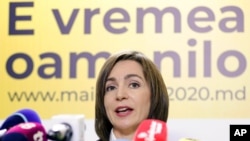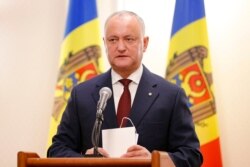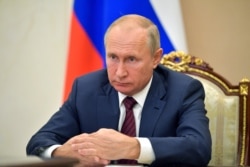A pro-European reformer has won the presidency of Moldova — defeating her Moscow-backed opponent in a second-round vote that centered around the economy, corruption, and what course the small, one-time Soviet republic would choose in the tug and pull between Russia and the West.
With all the ballots counted, Maia Sandu, 48, a former prime minister and World Bank economist who campaigned on increased European integration, had received just more than 57% of all votes cast.
She is the first elected female leader in Moldova.
Speaking on Monday, Sandu thanked supporters and promised to do her best to win over those who doubted her.
"I say to those who voted for my opponent — you did not lose, I will earn your trust every day,” Sandu said.
"Moldova should be a good home for all citizens regardless of their nationality and the language they speak," she added.
Her opponent, the incumbent President Igor Dodon, earned the support of 42% of voters despite support from Moscow and a scorched earth media campaign.
Despite both sides accusing the other of trying to rig the election ahead of the vote, Dodon accepted his defeat on Monday.
"Preliminary results have shown that Maia Sandu has won," Dodon told reporters.
Dodon insisted it was in fact his campaign that had registered an "unprecedented amount of violations" but urged his supporters to accept the results and move the political fight to another day.
“We have a duty to protect this country for the next generations,” said Dodon. “I will not give up.”
Observers had warned of the possibility of violence in the aftermath of the vote.
Voters abroad
Sandu’s landslide was fueled in part by voters living abroad, a common life choice for Moldovans as their own struggling economy has forced about 40% of the population to seek opportunities away from home.
The country is one of Europe’s poorest, with a grim economic forecast made worse by the ongoing coronavirus pandemic.
Long lines of voters could be seen outside Moldovan embassies in capital cities across Europe.
Yet, even with her victory, Sandu must now look to win over allies in the parliament if she hopes to carry out reforms.
Sandu, who leads the Party of Action and Solidarity, has indicated she would push to hold snap parliamentary elections as soon as possible to pursue her political agenda.
Yet a majority of seats currently belong to the Socialist Party, which announced it would return Doyon to the leadership role following the formal end of his presidency.
East vs West dimensions?
The Moldovan election appeared to be the latest challenge to Russia’s continued influence over former Soviet republics it once ruled.
Russian President Vladimir Putin has openly backed Dodon and had called on Moldovans to support his bid for another term. Russian political advisers arrived from Moscow to help manage the campaign.
Indeed, Dodon has been a loyal Kremlin ally in return, calling for good relations, attending key Kremlin events, and sitting out calls to sanction Russia over its seizure and annexation of Crimea from neighboring Ukraine.
Russian media portrayed the vote as a referendum on whether the Kremlin investment in Moldova would prove justified, or the latest former Soviet republic seeking to distance itself from Moscow's orbit.
Yet some observers argued that Moscow would learn from its mistakes after voters’ rebuke of Dodon.
Sandu’s victory “will motivate Moscow to take a more pragmatic attitude towards Chisinau" writes analyst Dmitry Trenin of the Moscow Carnegie Center in a tweet.
Putin issued a message to Sandu on Monday congratulating her on her victory.
"I hope that your work as the head of state will contribute to the constructive development of relations between our countries,” Putin said in his message, released by the Kremlin.
“This certainly serves the vital interests of the Russian and the Moldovan people,” he added.
In addressing the course of her future foreign policy on Monday, Sandu said she would seek a "true balance” by pursuing "pragmatic dialogue with all countries" including Europe, Russia and the United States.
Sandu supporters argue the incoming president was simply sticking with a pragmatic approach to foreign policy that had served her well in the past.
"Maia does come from this chain of pro-European politicians in Moldova,” says the European Council on Foreign Relations’ Nicu Popescu, who served as foreign minister under Sandu when she was prime minister for a period in 2019.
“But she’s also someone who sees pro-Europeanism as not built through hostile relations with Russia,” he told VOA.
“Much of the Moldovan population wants this approach,” he added.



